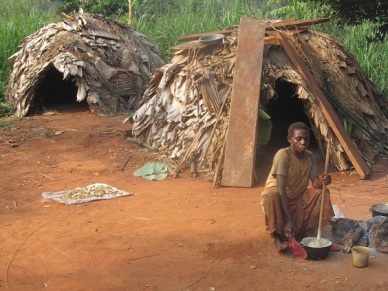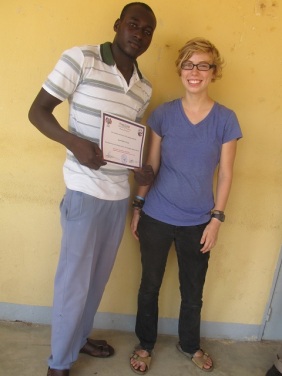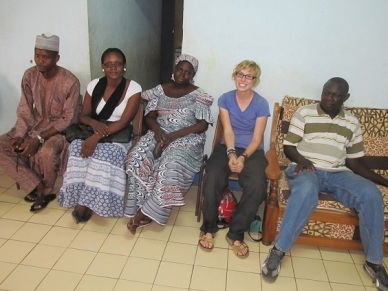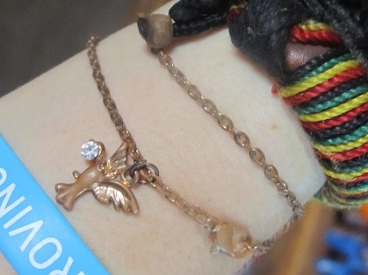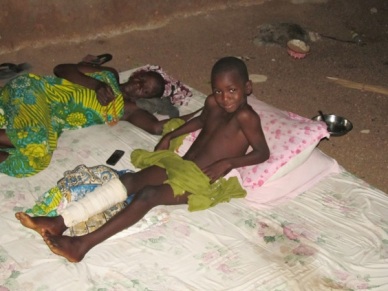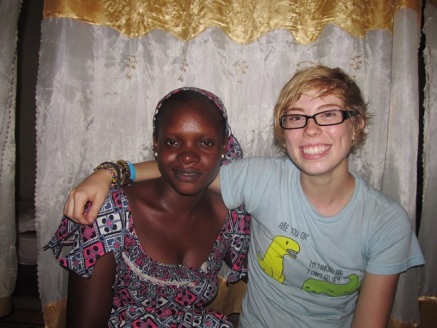With less than two months left in my Peace Corps service, time has taken on a different shape; while omelet sandwiches fried in carts on the sides of the road, moto taxi rides through sun-stained streets, and phone credit sold from umbrella-clad wooden tables have become features of the everyday life that I’ve loved and will continue to love and miss, the anticipation of things like grocery store aisles stocked with millions of varieties of prepackaged foods, public buses that run on posted schedules and leave at set times, and monthly phone plans that refill automatically, without even leaving the house, take me more and more outside of the moment.
It’s a strange contradiction. On the one hand, whenever Cameroonians idealize life in the U.S., making outrageous statements like “Poverty doesn’t exist over there,” I find myself irritated and defensive, trying to prove that things aren’t perfect where I come from; that people suffer everywhere. I often overcompensate by emphasizing all of the problems that do exist in the U.S. Yesterday, as I was getting on the back of a moto taxi, the driver said to me, referring to the difficulties of his work as a taxi driver: “We struggle here in Cameroon… People don’t struggle like this in America.” I asked him if he had ever been to the U.S. He replied that he hadn’t. I responded, “I’m an American… I’ve lived in both the U.S. and Cameroon, and as an American, I can assure you that what you believe about my country isn’t true. People struggle there, too.” He laughed and conceded, good-naturedly, “Okay, you’re right. You’re absolutely right.” I laughed, too, got on the moto, and that was that.
This “west is best” idea is unfair and insulting not only to the countless westerners who do struggle to make ends meet each day, who don’t live the paradisiacal life others may imagine it to be, but also to the countless non-westerners who live productive, self-sustaining, happy lives and are constantly bombarded by western ideals of what developed society should look like. And yet, at the same time, while I become frustrated by these crazy and unrealistic notions about my country, I find myself doing, to an extent, the very same thing I criticize others for – mentally building up aspects of the U.S. in ways I never would have done when I actually lived there. It’s not even as though I live in a remote village, without running water or electricity or cell phone service, as some volunteers and many Cameroonians do; but it’s still easy to focus, especially in these last couple of months, on the superficial degrees to which my life will be different when I return home – no more scrubbing clothes by hand in a bucket on my porch, or moto-ing into town to send a single email attachment, or bracing myself for an imminent power outage at the first signs of rain. Of course, these very differences are exactly why I chose Peace Corps service in the first place – to experience and live a different way of life than what I know and is familiar and comfortable.
But that’s just it: the fact that I can enjoy minor inconveniences, knowing that there’s a life-back-home to go back to, is a reminder of the biggest difference that will always separate me from the majority of my Cameroonian friends, that prevents me from ever truly integrating into Cameroonian society. It’s easy to dabble in life in a developing country when there’s an obvious endpoint in sight. As long as two years may feel, it’s not that long. Difficulties I encounter may be frustrating at the moment, but they’re fleeting. They’ll one day be those life-changing things I look back on as favorite memories, captured in folders of pictures on my laptop or smart phone, souvenirs of “life in Africa.”
Cameroonians who deal with these things every day don’t have that “out.” I’m not even talking about material stuff, lack of washing machines and wi-fi (technology that exists in Cameroon, but only amongst the extremely wealthy, and not nearly on the scale that it does in the U.S.). I mean it in a more general sense. I sometimes wonder: If I was born in Cameroon, would I have finished high school? Would I have started high school? Would I have a job? Would I be married, with kids right now? These are all questions I’ve never had to consider the implications of in the U.S. But in all likelihood, they are questions I wouldn’t like the answers to, had I been born a different nationality.
Yesterday and today, I spent my mornings at a health center, acting as go-between for a friend of mine and her husband. My friend, Anna (that’s not her real name, but I’ll call her that for the purposes of this story) was a student in 3ème—the equivalent of 9th grade—when her parents forced her to marry a man old enough to be her father (literally; he actually has children older than she is). Shortly after getting married, she became pregnant, but a couple of months into the pregnancy she fell ill; the illness continued for about a year, during which time she was forced to leave school and sent to stay with her parents. She finally recovered, but lost both the baby and her hearing in the process.
That was about five years ago. Now, at 19, she’s still married to a man she not only doesn’t love, but resents and dislikes; her husband spends most of his time at work, and rarely sleeps at home. When he is home, he openly berates Anna in front of everyone who comes to visit, profiting from the fact that she can’t hear what he’s saying. He claims she doesn’t behave as a good wife should – keeping the house clean, cooking, attending to his needs, etc. They argue constantly, and when they argue, he often refuses to give her money to buy food. If she’s not with friends or at the market, Anna spends her days alone in her house, watching TV and writing lyrics to American pop songs in a collection of notebooks – before she was forced to leave school, English used to be one of her favorite subjects, and she liked to perform skits and songs for English Club. While deaf schools exist in Cameroon, Anna does not have access to them, and has never learned to sign. With her extremely limited hearing, she communicates by reading lips—to the extent that she can—and relying on others to write down things for her to read.
The day before yesterday, I was at another neighbor’s house and learned that Anna was sick. My friend had accompanied Anna to a health center in town to do some tests, but neither of them understood what the doctor was saying – Anna couldn’t hear, and my other friend couldn’t follow the complicated French medical vocabulary the health worker was employing. To make matters worse, the document that the health staff printed out from the computer, explaining the test results, was in English, and even the nurse couldn’t read it very well. My friend asked me if I would accompany Anna to the health center again yesterday, and I agreed.
Yesterday morning, I waited for Anna to beep me (a short phone call where you hang up before the person answers so it doesn’t consume phone credit, and the other person calls you back using his or her own credit) to say she was ready to go. Instead, she sent me a text message, asking me to come to her house because her husband wanted to be sure she wasn’t lying about whom she was going to the heath center with. When I arrived, my friend and several other neighbors, as well as Anna and her husband, were sitting outside, heatedly discussing something. Anna’s husband abruptly declared that she wasn’t allowed to go with me, and that he would only give her money to go to the health center if she went with him; Anna refused. Her husband proceeded to insult her while the other neighbors blamed her for being unreasonable. Her husband was angry because when Anna had gone to the health center the day before, she’d asked her father for the money to do so, and didn’t tell her husband that she was going. The question of what was best for Anna’s health never once entered the scope of the discussion.
After a lot of confusion and awkwardness, it was finally settled that the three of us—me, Anna, and Anna’s husband—would go to the health center together. Once we were there, a nurse explained to us Anna’s medical problems – of which there were many. Throughout the visit, Anna’s husband loudly and repeatedly ordered me and all of the health staff to “tell Anna that she doesn’t behave like a good wife,” blaming her for things like “wearing jeans” and “spending time with unmarried, ‘free’ girls in the neighborhood.” The health workers politely listened to his rantings, tactfully suggesting—as I also tried to do—that he broach the subject, in a less accusatory way, with Anna herself. He wasn’t very receptive to this idea.
The results of one of Anna’s tests were inconclusive, so we had to come back today to redo it. Anna and I took advantage of the situation to arrive at the health center early, before her husband got there; her husband, for as long as they’d been married, had been taking daily pills for an unknown condition, but refused to tell Anna what they were or why he was taking them. Anna had previously tried stealing one of the pills and going to another health center to identify it, but health center staff refused to tell her unless she came back with a parent, which she could never ask her parents to do. When we explained what the pills looked like to this doctor, he reflected for a minute, and then informed us that they were most likely some form of illicit drug. As far as the rest of the visit, for the sake of Anna’s privacy, I won’t get into the details; but suffice to say, things didn’t get better.
These are the kinds of situations that make me feel ridiculous and spoiled for my excitement over grocery store food and unlimited texting. I’m five years older than Anna, and I have my entire future ahead of me. She’s stuck in a marriage with a man twice—possibly three times—her age, who doesn’t love or even respect her, because her family put her in that position. It’s horrible and unjust and unfair, and I don’t know what to do about it… So I write long, rambly blog posts.
I usually try to balance out these depressing entries by posting cute pictures of my cat at the end, but I have sad news… Citta died earlier this week. I found her outside my house, and while I’m not certain what happened, my best guess is she was bitten by a snake.
R.I.P. Citta. You will be missed. :0(

Read Full Post »


